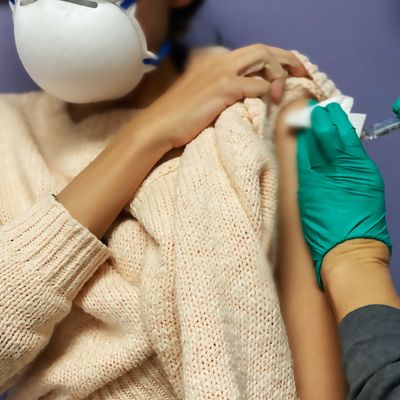
Not too long from now, every American adult will be eligible to receive the COVID-19 vaccine. This is unequivocally good news — all three vaccines currently on the market are highly effective against the novel coronavirus, and as vaccination rates rise, so do our hopes of resuming some semblance of normalcy. The CDC has said that vaccinated people can see other vaccinated people (and even a low-risk, unvaccinated person or two) indoors. As more people get vaccinated, those freedoms should expand in turn. Though a small segment of the U.S. population remains hesitant, there is no real downside to vaccination.
That said, it is possible that you will experience mild side effects when you’re vaccinated, and it can be helpful to know what to expect. Here, what public-health experts and people who have been vaccinated had to say about their experience.
Will I get side effects?
It’s hard to say for certain because every individual is different, but there are factors that make you more likely to experience side effects associated with the COVID-19 vaccine: namely, younger people and people who have already had COVID. “People less than 65 are more likely to have side effects associated with the vaccine,” says Paul Offit, a pediatrician at Children’s Hospital of Philadelphia who specializes in infectious diseases and vaccines. This is because young people tend to have stronger immune systems, and stronger immune systems can recognize a threat and react more quickly, which is what side effects indicate. For similar reasons, people who have already had COVID may experience more pronounced side effects because their bodies recognize the viral protein being introduced by the vaccine and want to fight it.
This is not to say that you’ll definitely have bad side effects if you’ve had COVID or that you definitely won’t have any if you didn’t; my friend Lola had COVID several months back but experienced zero side effects after both vaccination shots. Another friend who believes she had COVID last March experienced a sore arm after both shots and fatigue after the second. It’s impossible to know exactly how you’ll react until you get the shots (which you should absolutely do, says Offit).
Do women get worse side effects?
Possibly, though most public-health experts say there isn’t enough available information to draw conclusions. But because we know women tend to respond better to infectious diseases in general, Offit says he wouldn’t be surprised if women experience stronger side effects, indicating a stronger immune response. “If you look at who’s more likely to be hospitalized, who’s more likely to die, with any infectious disease, generally it tends to be men, because men are the weaker sex,” he says. “Just kidding. Or not.”
Is the second shot worse than the first?
Again, probably, if not necessarily. The reason you may experience worse side effects after the second shot is the same reason you’re more likely to experience side effects if you’ve already been infected with COVID: Your body recognizes the virus and is quicker to fight it.
Anecdotally, this tracks with most people I know who have had both shots (which remains, for now, a relatively small group). My mother-in-law, who is 64, was totally fine after the first shot but experienced some fatigue and chills after the second. My friend Laura, who has long COVID, experienced arm soreness and body aches after the first shot and, worse, more protracted side effects after the second, including sleeplessness, achiness, and fatigue.
Then there are the exceptions: Kimberlee experienced similar symptoms after both shots (“General feelings of ick and tiredness,” she says) about three to four days after the injection. Matt experienced “horrible nausea for 36 hours” after the first shot but was fine (with mild arm soreness) after the second.
Do the different vaccines have different side effects?
The Pfizer and Moderna vaccines have very similar side effects, while the single-shot Johnson & Johnson vaccine was found to have generally milder ones. For either two-shot vaccine, Offit says, it’s fairly common to experience any of the following side effects: low-grade fever, fatigue, muscle ache, joint ache, headache, and, less commonly, diarrhea.
After his second dose, “I had a fever and fatigue for two days, which I successfully treated by whining,” says Offit. The CDC also suggests taking over-the-counter pain meds as needed and drinking lots of fluids.
Why should I deal with vaccine side effects if I’m pretty sure I won’t get COVID/I’d be asymptomatic?
It may be tempting after your second vaccine, as you lie in bed feeling feverish and crabby, to resent it for making you “sick,” but please resist. “You’d much prefer the symptoms associated with these vaccines than the symptoms associated with COVID,” says Offit. Even if you’re young and otherwise healthy, you cannot be sure you wouldn’t get a serious case of COVID, and even “mild” COVID is plenty miserable.
Offit invites people hesitant to get the vaccine for imagined invincibility reasons to tour the hospital where he works. “It doesn’t matter how healthy you are. If you get the virus, you could be killed by it,” he says. “While it’s true that 92 percent of deaths are in people over 55, there are 175 children under 18 who’ve died of COVID. That’s about the same number as the flu every year, and we have a flu vaccine for that reason.”
While vaccine side effects may be unpleasant, they’re also a sign the vaccine is working. “When you make an immune response, your body makes a series of proteins in response to that infection. Those proteins cause symptoms, but that’s okay,” explains Offit. “It’s trivial compared to what people experience with this virus.”





